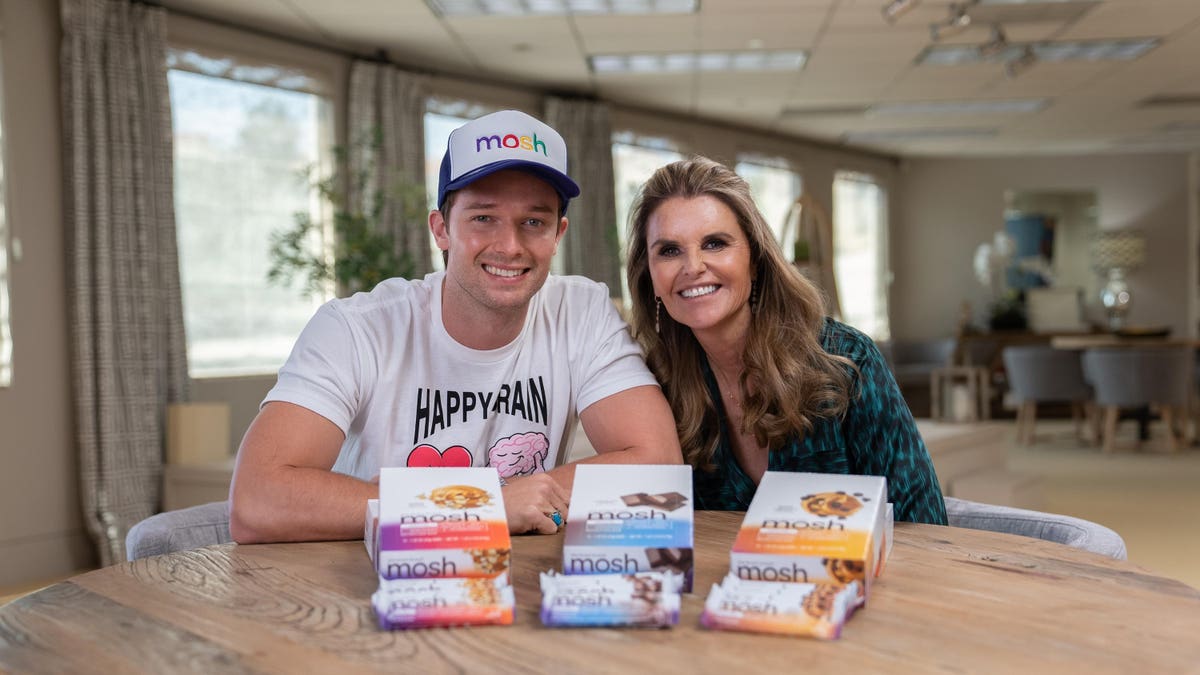The producer of brain health-focused protein bars MOSH, launched by Alzheimer’s advocate Maria Shriver and her son Patrick Schwarzenegger in 2021, has officially raised $3 million in series A, with near-term plans to launch offline for the first time in select retail stores and roll out new products.
This financing round, closed after MOSH sold nearly $10 million worth of products exclusively via direct-to-consumer, was led by celebrity-driven investment firm Main Street Advisors that has previously financed a number of high-growth consumer businesses, including Blaze Pizza, Dave’s Hot Chicken, Mendocino Farms, and TRUFF. Other participating investors are Joyance Ventures, The Lab Capital Advisors, Verso Capital, and Entrepreneur Ventures.
Paul Wachter, founder and CEO of Main Street Advisors, stresses how their investment decision was motivated by MOSH’s authentic leadership and commitment to the mission.
“Maria has been at the forefront of Alzheimer’s research and advocacy throughout many breakthrough learnings, and she is the perfect person to advocate for the connection of brain health and nutrition for all consumers,” Wachter said in a public statement. “Patrick has gained significant expertise working alongside companies as an investor and advisor. His experiences and his natural ability to lead are qualities we seek in our partners. Together, Maria and Patrick have quickly grown the MOSH brand with a lean team, and we cannot wait to see what happens when their products land on retail shelves.”
With seven different flavors currently in its portfolio, including recently added Blueberry Almond Crunch and Cookies & Cream Crunch, MOSH is purposefully packaged in colors inspired by brain scan. Each keto and sugar-free product contains about 12g of protein, multi-vitamins, lion’s mane, ashwagandha and omega-3s.
The primary goal for the next phase of MOSH’s growth is to foray into retail through a mix of direct store delivery and warehousing, in addition to developing new product lines and building out a more comprehensive team, according to Schwarzenegger, who has spent over a decade investing and advising CPG, notably Krave Jerky, Chubby Snacks, and Simulate Nuggs.
“We’re launching in all Earthbar and Equinox locations” as well as other local markets in Southern California, said Schwarzenegger. “Our strategy is to implement and execute in our backyard before expanding to the Pacific Northwest and the East Coast” that will likely total 1,800 retail stores in 2024, and up to the 5,000 the following year.
MOSH has been growing rapidly from the outset thanks to the increasing consumer awareness towards brain health, and continuous demand for the bars category. But like many startups launching during the pandemic, managing growing pains from misformulations, supply chain shortages, to excessive cash burn can be an onerous process.
“So many things go right and can go wrong each and every day — you really have to be malleable and willing to change by listening to your consumers,” said Schwarzenegger, while recalling how the company was out of stock for 12 weeks after initially selling out.
Then it came the challenge with R&D after switching to a different supplier that needs to provide the accurate specifications with certain ingredients — any slight changes in the heat level during processing and weather during shipping could significantly affect the outcome. After all, a successful consumer business is not built overnight, and takes much trial and error to ensure its profitability, Schwarzenegger believes.
“The reality in CPG is it’s extremely tough to be profitable,” Schwarzenegger explained, especially after iOS updates crippled digital advertisers, coupled with the rising cost of acquiring customers and intensified competitions on the market — “That’s when the mentality started to shift from ‘growing at all costs’ to ‘being profitable’.”
MOSH’s projected $7 million revenue in 2023 and 70% year-over-year growth will only be the tip of the iceberg when it comes to building a household brain brand. As the company is still in the early days of exploring TikTok, it has been gravitating towards audiences mostly between 40-60 years old, who generally have higher disposable income and care more about cognitive functionality.
“One of our goals this and next year is to focus more on the 30- to 40-year-old, since they’re still heavily shopping at retail,” said Schwarzenegger. “We’re not building this company to have an exit necessarily in the next few years, but to build out a brain brand that has multiple product lines and educate consumers that our brain and body are interconnected.”
Read the full article here





